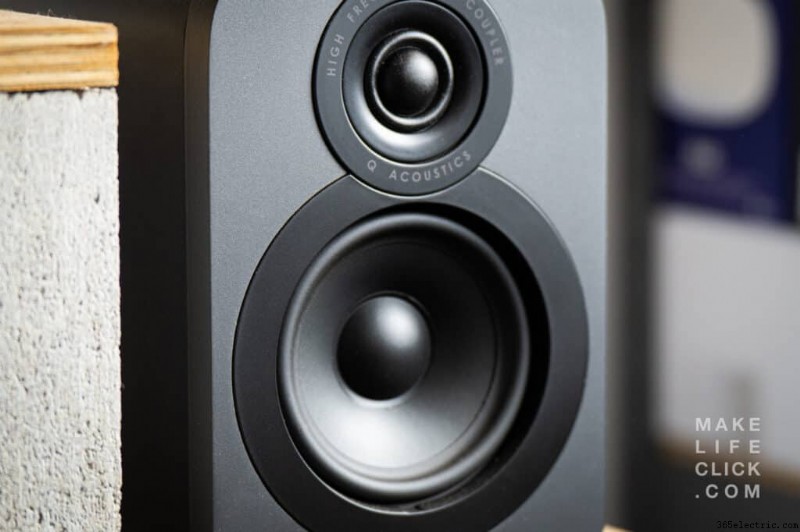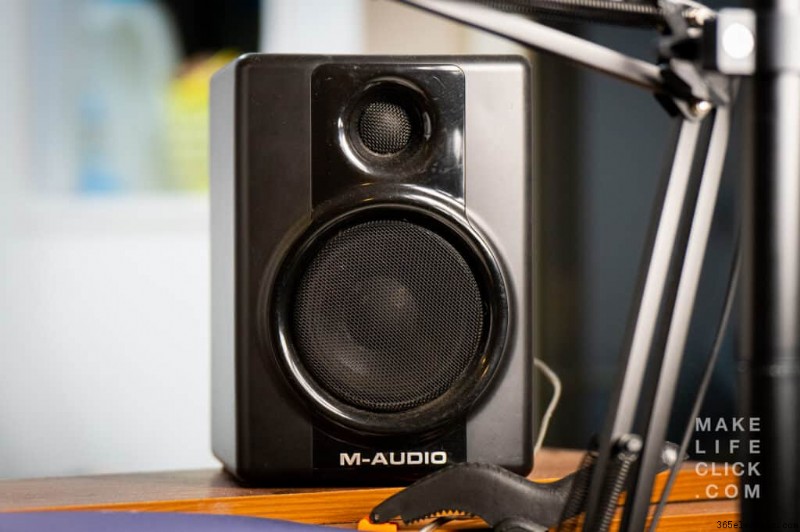Quel équipement Hi-Fi est le plus précis :casque ou enceintes ?
Les écouteurs ont porté l'accessibilité à un tout autre niveau - cela ne fait aucun doute.
Associez la liberté et l'intimité qu'offrent les écouteurs à la qualité sonore hi-fi, et vous avez un gagnant.
Mais cela signifie-t-il que les écouteurs sont toujours plus précis que les haut-parleurs ?
La réponse n'est pas aussi simple que oui ou non.
Avant de plonger profondément dans le monde de l'audiophilie, je croyais aussi que les systèmes de haut-parleurs ne pouvaient tout simplement pas battre un casque de bonne qualité.
Cependant, j'ai fait l'expérience des haut-parleurs hi-fi pour la première fois (en regardant Le Seigneur des Anneaux ). Et ce fut le jour où ma perception a changé.
Bien sûr, les écouteurs peuvent vous rapprocher du son que les artistes et les producteurs voulaient que vous entendiez, l'image stéréo peut être vraiment sublime.
Mais il y a quelque chose dans les haut-parleurs qui créent une expérience plus réaliste et plus réaliste.
Je ne parle pas seulement des subwoofers créant des basses à faire trembler les os - c'est tout le paysage sonore, des aigus aux médiums et tout le reste !
La qualité surround des haut-parleurs est également de loin supérieure, à mon avis.
C'est difficile à expliquer, mais lorsque vous comparez les deux côte à côte, il est évident que les haut-parleurs créent un son plus naturel. Et cela est particulièrement vrai pour la musique classique et acoustique.
Si vous voulez vous sentir comme si vous étiez dans la même pièce que l'Orchestre, en entendant chaque petit détail et chaque écho, alors les haut-parleurs sont définitivement la solution.
Cependant, dans le débat casque vs haut-parleurs, tout se résume à une préférence personnelle, mais il y a encore un autre élément très important à considérer; justesse du son.
Ici, je vais explorer les différentes manières dont les écouteurs et les haut-parleurs peuvent avoir un impact sur la précision du son, pour vous aider à prendre une décision plus éclairée.
Avantages des écouteurs :
- Ils isolent complètement l'auditeur de l'environnement.
- Ils fournissent des sons très précis car ils ne laissent aucun bruit externe interférer avec ce que vous entendez.
- Ils sont très portables et peuvent être emportés n'importe où.
- Ils sont relativement moins chers que les haut-parleurs.
- Vous pouvez les utiliser à tout moment sans déranger les autres.
Inconvénients des écouteurs :
- Ils peuvent endommager vos oreilles à long terme si vous les utilisez pendant de longues périodes à des volumes élevés.
- Ils peuvent être très inconfortables (les écouteurs plus que les écouteurs, mais je suppose que tout le monde s'accorde à dire que les écouteurs offrent une bien meilleure qualité que les écouteurs, n'est-ce pas ?), surtout si vous devez les porter pendant de longues périodes.
- Si les écouteurs ne sont pas de bonne qualité, ils ne seront même pas comparables aux haut-parleurs ordinaires, sans parler des haut-parleurs hi-fi.
- Ils ne sont pas aussi robustes ou durables que les haut-parleurs.
Avantages des conférenciers :
- Ils offrent un son plus réaliste et naturel que les écouteurs, compte tenu de l'environnement.
- Ils sont moins susceptibles d'endommager vos oreilles car la source sonore est plus éloignée de vos oreilles. Cependant, ils ont la capacité d'être plus forts que les écouteurs, ce qui peut avoir des effets néfastes si vous écoutez de la musique forte pendant de longues périodes (bassistes et fans de métal, vous savez de quoi je parle).
- Vous pouvez facilement partager votre musique avec d'autres.
- Ils sont généralement plus durables que les écouteurs.
- Ils sont généralement plus personnalisables et offrent un paysage sonore plus précis que les écouteurs.
Inconvénients des haut-parleurs :
- They are not as portable as headphones and can be quite bulky.
- You need a lot of space to set them up.
- They can be very expensive, especially if you want a high-end setup.
- They might not provide accurate sound if they are damaged, and unlike headphones, you won’t know of the damage right away.
So, which one is more accurate? There are several considerations to make before you make a decision, and the first is the definition of sound accuracy.
What is Sound Accuracy?
Sound accuracy is the ability of a piece of audio equipment to reproduce sound without any distortion. The higher the sound accuracy, the closer the reproduced sound will be to the original sound.
There are two main types of distortion – harmonic and intermodulation.
Harmonic distortion occurs when the waveform of the reproduced sound is different from the waveform of the original sound.
Intermodulation distortion , on the other hand, occurs when two or more frequencies mix together to create new frequencies that were not present in the original sound.
The mixture of these waves can also increase or decrease the volume of your music, depending on whether the wave interference is destructive or constructive.
Harmonic distortion is usually more noticeable than intermodulation distortion, as it can make the reproduced sound “muddy” or “blurry”.
However, both types of distortion can impact the sound quality and make it less accurate.
Less accurate sound in high fidelity terms means that you won’t be able to identify different instruments and effects introduced into the sound and may miss out on the true depth of the music.
Headphones vs Speakers:Which is More Accurate?
There are several factors to consider when deciding which type of equipment is more accurate – headphones or speakers.
- The type of distortion: As I discussed earlier, harmonic distortion is more noticeable than intermodulation distortion. Therefore, if you are looking for sound accuracy, you should look for headphones or speakers that have low levels of harmonic distortion.
- The frequency response: The frequency response is the range of frequencies that a piece of audio equipment can reproduce. The wider the frequency response, the more accurate the reproduced sound will be.
- Power handling: Power handling is the amount of power that a piece of audio equipment can handle without distorting the sound. The lower the power handling, the more distortions and issues you will need to deal with in your hi-fi equipment.
- The sensitivity: The sensitivity is the amount of sound that a piece of audio equipment can produce with a given amount of power. The more sensitive your hi-fi equipment is, the more prominent the distortions will be, but it will also mean that you will hear every single detail of your music. The best way to ensure higher sensitivity and lower noise are to go for speakers or headphones that have a higher impedance/resistance reading.
- Volume: People tend to increase the volume on headphones by 20% to 50% headphones than on speakers. This can cause the sound to become distorted, which will reduce sound accuracy. However, the same sound level on speakers can also produce distortion if the speakers are not of good quality. Furthermore, the distance between you and the speakers can introduce other sounds as well, which can reduce accuracy.

The Major Consideration:Your Goal
While all of the above elements do have a prevalent impact on your music’s accuracy and quality, it is important to note that which equipment to use will be impacted severely by what your goal is.
If you are looking for sound accuracy for professional use, such as in a studio, then speakers are the way to go.
This is because they provide the widest frequency response and the lowest levels of distortion.
They most often have a near field design, meaning they can be close to you and still throw the sound with decent imaging and a full sound stage.

However, if you are looking for sound accuracy for personal use, such as listening to music at home, then headphones are the way to go. This is because they provide a more intimate listening experience and you can control the sound level more easily to avoid distortion.
No matter what your goal is, it is important to consider all of the above factors before making a decision. Different people have different preferences, so what might be the best for one person might not be the best for another. The most important thing is to find what works best for you.
My Personal Opinion
Personally, I am a fan of hi-fi speaker systems. I like the idea of being able to hear all the different instruments and sounds in a song, and I think that speakers provide the best opportunity to do that.
I also appreciate being able to control the sound level and create a custom listening experience.
Furthermore, high-fidelity speakers that offer surround capabilities have proven to create a much better “vibe” for me than headphones have.
I feel more engaged with my music, and the experience is just more enjoyable for me.
That is not to say that I dislike or don’t use hi-fi headphones, though.
During composition and mixing, I usually wear headphones and have several dedicated pairs for different occasions.
Using both types of hi-fi equipment, I understand that not everyone has their own preference – and the debate between headphones and speaker systems is one for the ages.
Some people prefer to have a more personal listening experience with headphones, and that’s perfectly fine. There is no right or wrong answer – it really depends on your preferences.
lequel préfères-tu?
Let me know down in the comment section to continue the discussion!
